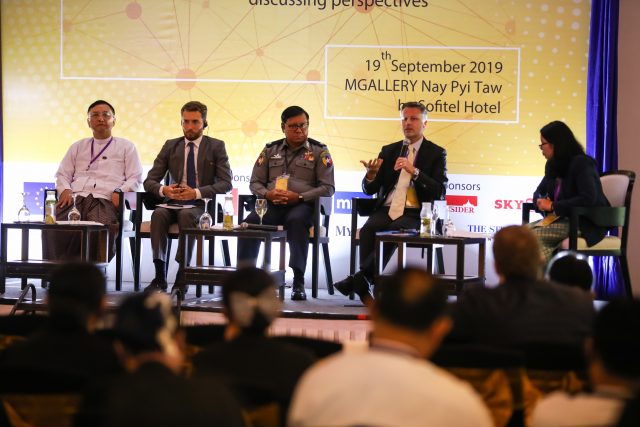EuroCham hosted the second edition of Anti-illicit Trade Forum with the support of MoC, MoPF and MFIU (Myanmar Financial Intelligence Unit) in Nay Pyi Taw on Thursday, September 19, 2019. The second time forum stimulated the importance of data on illicit trade activities in Myanmar with an improved level of communications among EuroCham Myanmar Advocacy Group, high-level government bodies and industry representatives to assess the illicit trade societal and environmental impacts.
EuroCham worked with its Anti-Illicit trade members to set up an exhibition showcasing the extent of illicit trade in Myanmar. European companies working in beer, spirits, cigarettes, cosmetics, bread improvers and flower bulbs industries presented to the media and high government representatives, who include H.E. Soe Win, Union Minister of Planning and Finance, Maw Than, Auditor General of the Union, Myat Myat Soe, Commissioner of Anti-Corruption Commission, and Aung Naing Oo, Permanent Secretary, Ministry of Investment and Foreign Economic Relations. Explanatory images of seized smuggled and counterfeit products as well as some smuggled and counterfeit goods available for purchase in many shops were also displayed in order to assess the extent of illicit trade in Myanmar.
As an opening remark, Marc de la Fouchardiere, EuroCham Myanmar Executive Director, said “We’re happy to learn that the Government of Myanmar has been strengthening its efforts to combat illicit trade in Myanmar and we welcome the formation of Illicit Trade Eradication Steering Committee in June 2019, chaired by the Vice President H.E. U Myint Swe. We have started to witness a lot of positive changes in terms of illicit trade control. The most recent example is the agreement this month between Myanmar and China to resume joint inspections of their common border for the first time in 24 years.”
Troels Vester, Myanmar Country Manager of the United Nation Office on Drugs and Crime (UNODC) shared insights on illicit trade circumstances in Myanmar covering the proximity with China, several borders, conflict zones and low consumer awareness, not only about the loss of tax, but also the costs for the government, for example, the cost related to damaging products the public healthcare system and “free trade zone” where law enforcement is extremely difficult.
H.E. Soe Win, Union Minister of Planning and Finance informed the public regarding the short and long-term strategic plans of the newly established Anti-Illicit trade Steering Committee. In particular, he insisted on reinforcing border and checkpoints controls together with surprised checks in the short time, while, on the long term, coordination, E-lock, single-stop inspections and bonded warehouse systems will be introduced.
Myanmar Market Research & Development Research Director, Aung Min, delivered a presentation on the key findings of the report commissioned by EuroCham as a follow up to the 2018 report from TRACIT and its Global Illicit Trade Index. According to the customs department’s data, the total amount of seized products represented a shockingly low 0.4% of the estimated $6.4 billion of the known illicit trade amount.
The first panel on regulatory framework was discussed mainly on the root cause of illicit trade. The representative from the MoC, pointed out “Myanmar’s geographical position and the lack of awareness from the general public.” Consecutively, Co-chair of Anti-illicit Trade Advocacy Group, Khine Wai Thwe, stressed out that “European companies are eager to invest sustainably, but there needs to be a level playing field and guaranteed transparency in trade for all the businesses operating in Myanmar.”
According to Matthieu Glorieux, Managing Director Seagram Myanmar, who was one of the participants for the second panel, one factor that will help to remove the smuggling business, is the market mechanism: the high price differential caused by the Special Good Tax and the Ban of foreign Spirits, disadvantage the local producers.
In the afternoon, round table sessions on the following sectors: Beverages & FMCG, Intellectual Property, Agrobusiness and Health were organized. After roundtable discussions, a short presentation from the Southeast Asia Intellectual Property Right helpdesk was delivered by Ms. Yuwadee Thean-ngarm, which highlighted the current protection of IP rights under the new trademark Law and on Patent and copyright in Myanmar and new developments with the new law coming next year.










